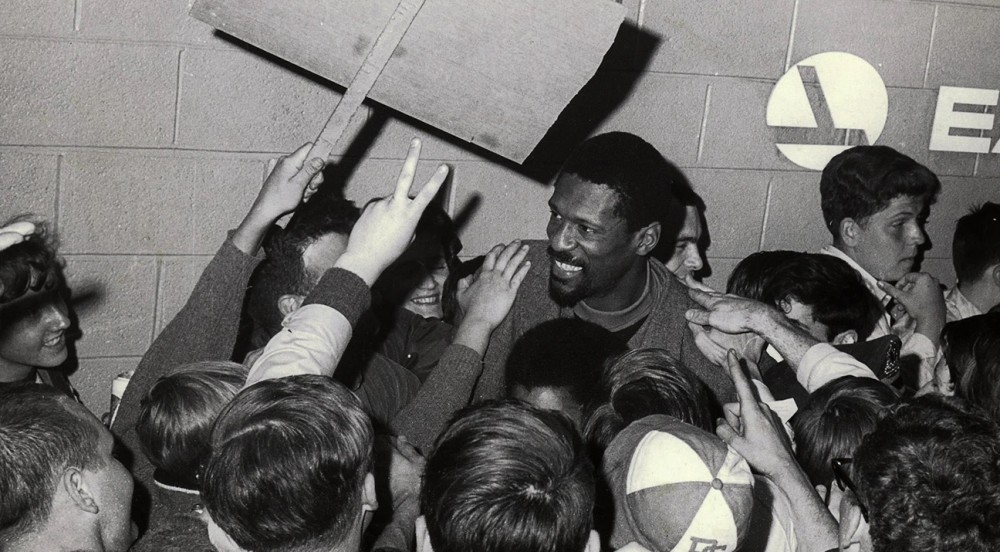The Netflix original documentary, “Bill Russell: Legend” details the life and legacy of NBA icon Bill Russell prior to his passing in 2022, providing yet another opportunity to celebrate the accomplishments of the seemingly larger-than-life legend, both on and off the court.
When you’ve had the kind of basketball career that Bill Russell had, one in which all the usual trappings of success—awards, championships, fame, money—came your way, that often serves as the defining measuring stick of your greatness.
But Russell, who passed away on July 31, 2022, was anything but usual or ordinary.
He was a larger-than-life figure on several levels, some of which can be seen in the newly released Netflix original documentary Bill Russell: Legend, which is directed by Academy Award-nominated Sam Pollard.
The two-part series chronicles the life and legacy of one of the greatest basketball players to ever play the game, a man who brought about massive changes on the basketball court as well as in the court of public opinion when it came to Blacks.
His work championing causes such as racism in the 1950s and 1960s was even more important than the work he did in leading the Boston Celtics to repeated championships—11 of the franchise’s 17 to be precise—on the hardwood.
But in Bill Russell: Legend, we get a better glimpse at not just what Russell accomplished but also what that meant to those around him at that time, and those who benefited from his trials and tribulations, today.
Golden State Warriors guard Stephen Curry is among those who readily believe many of the benefits he has enjoyed as a player are a direct trickle-down from the battles against racism that Russell fought.
“The simple fact is we’re not here without his contributions on and off the court,” Curry told EBONY in an exclusive one-on-one interview. “His influence is everywhere.”
Indeed, Russell on many levels was the example he wanted others to emulate.
For all his basketball accomplishments, what often set him apart from others and rarely got as much attention and focus as it should have, was his intelligence.
In Bill Russell: Legend, we learned that his most prized possession growing up was his library card from Oakland Public Library in Oakland, California.
It is here where Russell embraced the intellectual freedom that so many Blacks across the country were limited in having, or outright denied.
That intellectual curiosity would become an integral part of his own personal journey and evolution into being an agent of change, both on the basketball court as well as in the fight for racial justice.
And while many in this era among athletes are praised for their social activism, that was not the case during Russell’s time.
It has been well documented the challenges he faced during his time as a Boston Celtic, coming home at times to his home being vandalized.
And while such actions were obviously disappointing, Russell remained undeterred in his quest for equality.
“Bill was fighting for something much bigger,” NBA Hall of Famer and former Atlanta Hawks forward Dominique Wilkins, said in the documentary. “And that was to belong on equal playing field as white America.”
It was a long and hard road that Russell chose to travel, but it was one that did have moments when progress was undeniable.
The documentary details an exhibition game in Louisiana, one of the few times during Russell’s career that he got a chance to play in front of family and friends that knew him from his days as a youth in his hometown of Monroe, Louisiana.
Attending the game was his grandfather who was known to most as Mr. Charlie.
After the game, Mr. Charlie came inside the Celtics locker room and was brought to tears by what he saw: Sam Jones, a Black man, just getting out of the shower while having a jovial conversation with John Havlicek who was white.
“I never thought I'd live to see the day water would run off a Black man onto a white man,” Russell recalled Mr. Charlie saying, in the documentary. “He kept shaking his head [and said], “I could tell those two men like each other.”
Something as simple as a conversation between two men—one Black and one white—was a mile marker of sorts in the journey that Russell was on in his pursuit of racial equality.
For his lifetime efforts of making a difference, Russell was awarded the Medal of Freedom in 2011, the highest civilian honor in our country.
Then-president Barack Obama gave a moving speech about the impact of Russell.
“More than any athlete of his era, Bill Russell came to define the word “winner,” Obama said. “Bill Russell the man is someone who stood up for the rights and dignity of all men. He marched with [Martin Luther] King; he stood by [Muhammad] Ali. He made possible the success of so many who would follow.”
And it is in that spirit that Russell: Legend captures the essence of who Russell was, which is a legend among legends—on and off the court.













